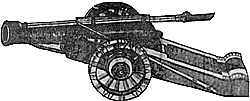 Wargamers interested in the effects of early artillery may find the following of use.
It comes from Machiavelli's THE ART OF WAR, first published in 1521 (this from the
recent paperback edition from Da Capo).
Wargamers interested in the effects of early artillery may find the following of use.
It comes from Machiavelli's THE ART OF WAR, first published in 1521 (this from the
recent paperback edition from Da Capo).
Machiavelli first states that it is not worth firing one shot in battle as the enemy might re-load before you do! Thus he advocates one volley and then a brisk attack by light cavalry and infantry on the flanks to capture the enemy's guns. He continues with a second reason:
"There is noithing that occasions greater confusion and embarrassment among a body of men than having their sight dazzled or obstructed; this is a circumstance that has been the ruin of many gallant armies blinded either by the sun or by clouds of dusk: and what can contribute more to that than artillery smoke?
It would he more prudent therefore to let the enemy blind themselves. Thus I would either not use any artillery at all, or if I did to avoid censure now that large guns are in such credit - I would place it along my flanks so that when it was fired, the smoke might nor blind my men in front, where I would hav e the flower of my army.
The same passage discusses the fact that all artillery shot flew over the heads of infantry in one battle.
'I answer that it more often happens that way than otherwise; this is so because infantry stands so low and because it is no easy matter to manage the heavy pieces nf cannon well - if you elevate them or lower them the slighest bit too much in one case the balls will fly over their heads, and in the other case they will fall in the ground and never come near them. The least inequality of terrain is also a great boon for them, since any little bank or brake between them and the artillery serves either to hinder the shot or to divert it.
As for the cavalry and especially the men at arms (who because they are drawn up in closer order and stand so much higher than light cavalry are more exposed in danger), they may stay in the rear until after the artillery has fired.
It is certain that small pieces of cannon and shot from harquebuses do more damage than heavy artillery.... I therefore had my artillery drawn off as soon as it had been discharged in order to make room for my battalions to advance.
Back to Renaissance Notes & Queries #2 Table of Contents
Back to Renaissance Notes & Queries List of Issues
Back to MagWeb Master Magazine List
© Copyright 1998 by Partizan Press.
This article appears in MagWeb (Magazine Web) on the Internet World Wide Web.
Other military history articles and gaming articles are available at http://www.magweb.com